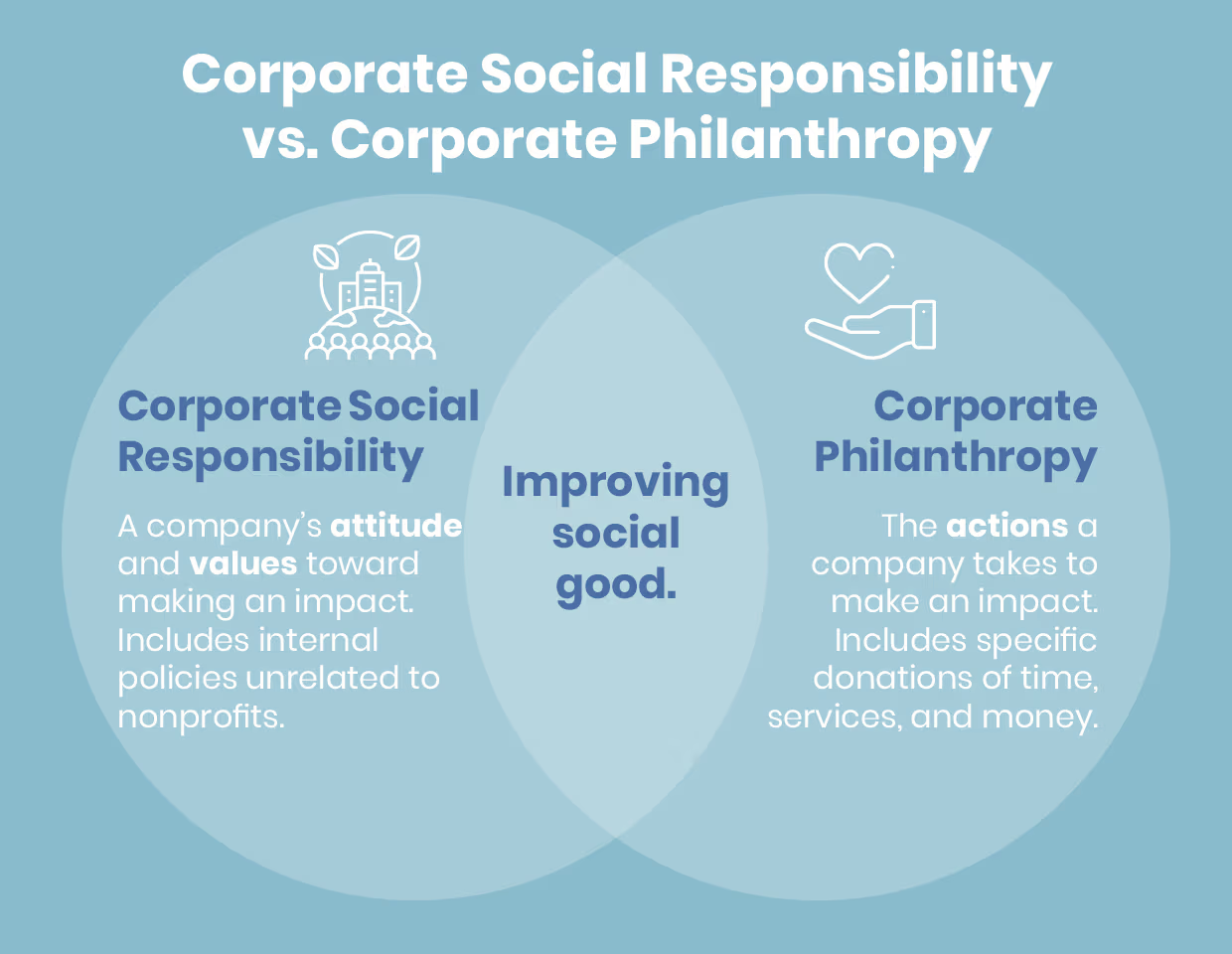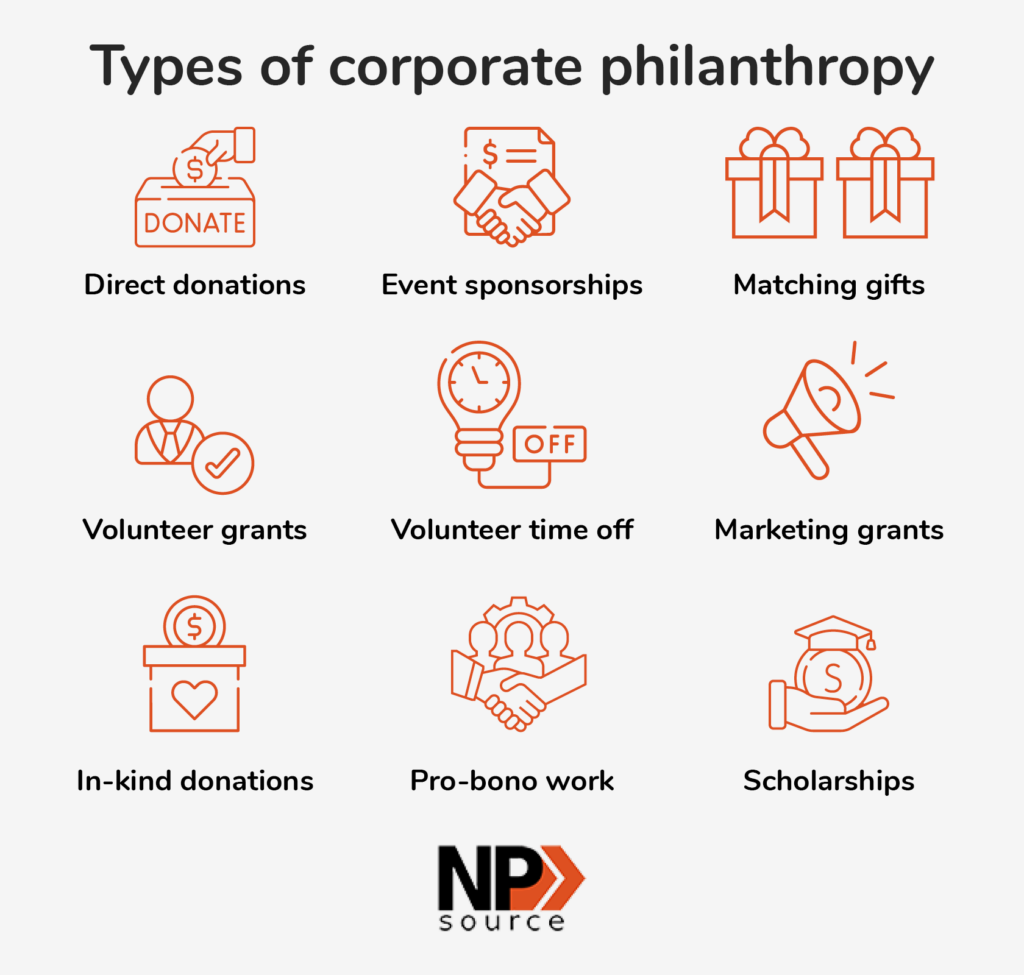Why Business Philanthropy Matters: An Overview to Company Social Obligation
Company philanthropy offers as a necessary component of corporate social obligation. It shows a company's devotion to societal issues and enhances its public image. Services engaging in philanthropic initiatives commonly see boosted worker morale and stronger community connections. Nevertheless, real influence of these campaigns can be complex and complex. Recognizing the subtleties of corporate philanthropy can brighten its relevance in today's business landscape. What are the essential factors that drive its success?
The Interpretation of Business Philanthropy
Company philanthropy refers to the charitable contributions and campaigns taken on by organizations to sustain social reasons and community advancement. This principle encompasses a variety of activities, including financial contributions, staff member volunteer programs, and in-kind presents of services or products. Companies take part in philanthropy to deal with social concerns such as education, healthcare, environmental sustainability, and poverty relief.
Normally, company philanthropy is structured via official programs or collaborations with not-for-profit companies, allowing companies to leverage their resources successfully. These efforts often intend to make a favorable influence on the neighborhood while lining up with the company's values and mission. Additionally, business philanthropy mirrors a dedication to business social duty, showcasing how organizations can add to society past profit generation. By getting involved in kind efforts, companies can play a substantial function in fostering social modification and addressing community requirements.
Benefits of Company Philanthropy for Businesses
Involving in company philanthropy deals various benefits for services, boosting their online reputation and promoting more powerful area ties. Business that proactively join humanitarian campaigns typically experience raised employee spirits and loyalty. When employees view their company as socially accountable, they are a lot more likely to feel pleased with their work environment, resulting in higher levels of task complete satisfaction and retention.
Company philanthropy can develop important networking possibilities. Teaming up with non-profits and neighborhood organizations allows services to get in touch with like-minded individuals and groups, possibly bring about partnerships that can benefit both parties. Additionally, services took part in philanthropy might find themselves much more enticing to financiers and stakeholders who focus on ethical methods.
Inevitably, company philanthropy not only supports social needs but also gives substantial benefits to businesses, producing a win-win circumstance that advertises development and sustainability while adding favorably to the globe.
Enhancing Brand Name Commitment Via Social Responsibility
Enhancing brand commitment via social obligation entails building count on with consumers by straightening corporate activities with community worths (corporate philanthropy). Firms can foster deeper links with neighborhood interaction campaigns that resonate with their target market. Furthermore, genuine brand name storytelling can better strengthen commitment by showcasing genuine commitment to social reasons
Structure Trust Through Action
Building depend on via activity is a powerful approach that firms can execute to enhance brand loyalty and foster much deeper links with consumers. When organizations proactively involve in business philanthropy, they show a commitment to honest techniques and social obligation. This proactive method not just boosts their credibility however also resonates with customers that focus on values placement. Transparency in philanthropic initiatives is vital; companies must successfully communicate their campaigns and the influence they are making. Authenticity plays a considerable duty as well; consumers are more probable to sustain brand names that really care concerning societal concerns instead of those that take part in superficial advertising. Ultimately, by focusing on meaningful actions over mere words, companies can nurture long-lasting trust and loyalty amongst their consumer base.
Community Interaction Initiatives

Authentic Brand Name Storytelling
Community engagement initiatives often serve as a foundation for authentic brand name storytelling, which plays a significant function in cultivating brand name loyalty. By sharing real narratives about their social obligation initiatives, firms can link emotionally with customers. These tales highlight the brand's values, goal, and commitment to societal improvement, promoting count on and relatability. When customers regard a brand as socially accountable, they are most likely to create a much deeper fondness and choice for it. Genuine narration also encourages transparency, welcoming consumers to involve with the brand name on an individual level. As a result, companies not just enhance their track record yet additionally build lasting relationships with their target market, inevitably leading to enhanced loyalty and campaigning for in an affordable market
The Duty of Employees in Business Philanthropy
Employees play a crucial function in shaping a company's philanthropic initiatives via their interaction and participation. Effective employee involvement techniques can enhance volunteerism, resulting in meaningful neighborhood impact. As companies harness the cumulative power and enthusiasm of their labor force, they can foster a society of considering that prolongs past the office.
Worker Engagement Techniques
Engagement in click here for more company philanthropy cultivates a feeling of purpose that prolongs beyond simple profit-making. Business can boost staff member involvement by executing numerous approaches Go Here that encourage engagement in kind initiatives. One reliable approach is to establish a matching present program, where the company matches worker contributions to qualified charities, amplifying their impact. Furthermore, normal communication about philanthropic initiatives can create awareness and influence workers to add their time and sources. Giving systems for staff members to share their philanthropic interests fosters a sense of possession and neighborhood. Acknowledging and rewarding workers for their humanitarian contributions can likewise reinforce a society of giving, inevitably bring about a more involved workforce aligned with the business's social responsibility objectives.
Volunteerism and Area Influence
Business philanthropy grows when people proactively take part in volunteerism, straight affecting the neighborhoods they offer. Staff member participation in volunteer efforts not only boosts firm society but likewise promotes a sense of purpose and connection among personnel. Via offering, employees establish important abilities, such as team effort and leadership, which can equate into boosted job performance. Additionally, when employees unify for neighborhood causes, they reinforce their bond with the organization, boosting general spirits and commitment. Organizations that urge volunteerism commonly see a favorable public picture, as community interaction mirrors their dedication to social obligation. Ultimately, the cumulative corporate philanthropy influence of worker volunteer initiatives can transform areas, resolving pressing social problems while reinforcing company worths and objective.

Measuring the Effect of CSR Initiatives
As organizations increasingly buy business social obligation (CSR) initiatives, comprehending their effect ends up being important for evaluating performance and directing future efforts. Measuring the impact of CSR calls for a diverse approach, incorporating both qualitative and quantitative metrics. Secret efficiency indications (KPIs) such as community interaction levels, employee fulfillment, and ecological improvements supply useful understandings into the end results of CSR programs. Surveys and meetings with stakeholders can reveal the social adjustment created by these initiatives, while information evaluation assists track progress versus established goals.
Aligning CSR goals with company goals improves accountability. Organizations can make use of structures such as the International Reporting Initiative or the UN Sustainable Growth Goals to standardize their measurement processes. Eventually, precise analysis of CSR initiatives not only demonstrates a firm's dedication to social responsibility but also notifies technique changes to take full advantage of positive influence, promoting a culture of sustainability and community interaction.
Ideal Practices for Applying Efficient CSR Methods
Carrying out efficient CSR methods calls for a clear understanding of an organization's goals and worths, guaranteeing alignment with stakeholder assumptions. Successful business start by carrying out a comprehensive analysis of their social, ecological, and financial effects, permitting them to identify locations for renovation. Stakeholder involvement is important; organizations should proactively include workers, customers, and neighborhood members in the development and execution of CSR initiatives.
Openness is one more best technique, as it promotes count on and responsibility. Business ought to connect their CSR objectives and development freely, sharing both successes and difficulties. Furthermore, integrating CSR into the core service strategy improves its impact, making it a fundamental part of operations as opposed to a second thought. Normal analysis and adaptation of CSR efforts, educated by stakeholder feedback and changing societal requirements, guarantee importance and efficacy. By sticking to these techniques, organizations can develop lasting and purposeful CSR methods that resonate with their communities.
Regularly Asked Inquiries
Just How Can Small Companies Take Part In Company Philanthropy?
Small companies can take part in business philanthropy by donating a percent of revenues, funding regional occasions, partnering with nonprofits, using employee volunteer days, and taking part in community solution tasks, promoting a positive impact and improving their brand name track record.
What Prevail Mistaken Beliefs Regarding Corporate Philanthropy?
Common false impressions concerning corporate philanthropy include the idea that it's exclusively an advertising and marketing device, that only huge business can participate, and that it does not have real effect. Several ignore the value little businesses can add via meaningful involvement.
Just How Do Consumers Perceive Firms Taken Part In Philanthropy?
Consumers usually view business engaged in philanthropy positively, linking such efforts with company responsibility, moral actions, and neighborhood support. This assumption can enhance brand name loyalty, influence getting decisions, and boost total company reputation in the industry.
Are There Tax Advantages for Companies Involved in Philanthropy?
Companies associated with philanthropy often enjoy different tax obligation benefits, such as deductions for philanthropic payments. corporate philanthropy. These incentives can improve a firm's economic standing while promoting a positive public image through their community involvement initiatives
Can Corporate Philanthropy Improve Staff Member Retention Fees?
Business philanthropy can boost employee retention rates by promoting a sense of function and belonging amongst staff. Involved workers, straightened with business values, are most likely to continue to be committed and satisfied within their roles.
Business philanthropy serves as a vital component of company social duty. Corporate philanthropy refers to the philanthropic contributions and initiatives embarked on by organizations to support social reasons and area advancement. Furthermore, corporate philanthropy shows a dedication to company social obligation, showcasing exactly how services can add to culture past profit generation. Engaging in business philanthropy offers many advantages for businesses, enhancing their reputation and cultivating stronger neighborhood connections. Customers typically view companies involved in philanthropy favorably, associating such efforts with corporate obligation, ethical habits, and neighborhood support.